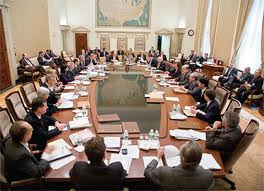Are they lying or are they stupid?
I was born and raised in the Northeast… born in Manhattan… father’s family from Boston with too many Harvard grads to count… and I grew up in Pittsburgh. As a result… well, it’d be more than safe to say that I’ve never been at risk of being confused with a Southerner. To my knowledge, after meeting me, nary a soul has later posited: “I forgot to ask, is Martin originally from Alabama or Mississippi?”
Truth be told, people from the Northeast are not bothered in the least by the fact that they’re never mistaken for Southerners. Truth be told, as soon as many Northeasterners hear an opinion uttered in a Southern accent, we get tempted to respond by saying things like, “Thanks Ebb. Now go on… don’t you have a lunch counter to segregate, or something like that?”
All right, calm down… it’s a joke… sort of… but my point here is that I’m familiar with the pompous air of intellectual superiority invariably inbred in the stereotypical cartoon Northeasterner, but let’s face it… you held onto the whole segregation thing far too long, and whenever there’s controversy over whether evolution should be taught alongside “creation science,” in public schools, it’s never coming out of Philadelphia.
Alright, I’ll stop fooling around… you know what I’m saying, and besides my point is that while I perhaps used to be capable of leaning that way when it came to southern accents, once I turned 18 years of age, enlisted in the United States Air Force, and found myself sans hair wearing fatigues and combat boots and saluting second lieutenants like they were four-star generals, all that Northeastern intellectual superiority crap flew straight out the window… of the pick-up truck for which I was now inexplicably longing.
You meet and come to respect all kind of folk when you serve in the U.S. military, and before you know it you’re craving SOS on toast, and saying, “Thank you, Ma’am,” with Gomer Pyle-like enthusiasm for the extra scoop of sausage gravy ladled onto your plate.
The fact is, joining the service, as we used to call it, does wonders to wipe any sort of superior smirk of your face, no matter how it got there in the first place. You act like an idiot at the NCO Club bar, as I did once just after my 21st birthday, and a Master Sargent cured me of that little behavioral shortcoming with just one punch to my not-so-superior nose. Say what you will about his methods, but that man knew how to get a point across.
So, why was I telling you about all this? Heck if I know…. no, wait… I remember… it’s because although I grew up in the Northeast, over the years I’ve learned to love the English language as spoken by those that hail from our nation’s southernmost states. It’s not that I still didn’t cringe just a little every time Jesse Helms stepped to the podium, but I sure do love the way Southerners communicate with each other.
I remember sitting at the counter of a Waffle House in the Florida panhandle one time, watching these two women waitresses interact as they went about their work serving us all breakfast one morning. One woman was clearly the more experienced of the two, and you could tell that she was in charge, even though they were both taking orders and refilling coffee cups as they communicated back and forth with each other as needed.
The less experienced waitress was having a problem with the coffee maker and figured she’d solicit help from her more experienced co-worker by calling out to explain the specific nature of the problem she had brewing. Without missing a single beat in the tempo of the dialog, her more experienced co-worker replied in a tone and cadence straight off of the Steel Magnolia’s set: “Why Sugaah, I’m sure I don’t caahar.”
And that was that… the problem got solved and I can’t remember how… it didn’t matter… and I returned to my biscuits and gravy.
See, the New York City version of that same sentiment would have been something like, “Hey, what do I look like, Mrs. Coffee over here? Figure it out yourself, bafangool.” And then, silently… the patrons would have immediately divided into two camps, with half agreeing that the less experienced waitress was in fact, bafangool… and the other half thinking the more experienced waitress was a jerk… picking back up a dollar or two that they were about to leave her as a tip before she had revealed her true self through her chosen reply.
“Why Sugaah, I’m sure I don’t caahar,” was a much better way of saying things. It was Southern speak for… “F#@k you,” but in a way that didn’t make anyone feel like taking sides.
So, why am I going the long way around the barn telling you this story? Well, because of Federal Reserve Chairman Ben Bernanke, silly. Aren’t you following me yet? Okay, let me spell it out for you.
Yesterday, the Federal Open Market Committee or FOMC, which is a group of Federal Reserve Bank presidents and members of the Fed’s Board of Governors, that since being established by the Banking Act of 1933, meets eight times a year to set “monetary policy” by establishing the Fed’s short-term “open market operations,” which is what they call it when the Fed buys and sells U.S. Treasury securities.
The FOMC sets the target for the “federal funds rate,” the interest rate that banks charge each other for overnight loans, and that target rate impacts the interest rates charged on various loans to both businesses and consumers, which in turn impacts the U.S. money supply.
(If that’s all Geek to you and you’re interested in learning more about how it all works, here’s a link to a Wikipedia page about the FOMC, or send me an email and I’ll be happy to help you translate it from finance geek to regular English.)
Anyway, the FOMC releases transcripts of it’s meeting minutes and slide presentations five years after they’ve taken place, and yesterday the 2006 meeting transcripts were made public. (You can find the entire year of 2006 FOMC transcripts, etc. HERE. However, please consult your physician before reading too much of them, as certain combinations of medications and FOMC transcripts can lead to depression and suicidal thoughts… I’m pretty sure.)
That’s why you’ve seen a flurry of articles over the last 48 hours talking about how Bernanke, who assumed the throne in 2006, following the Reign of Greenspan that had lasted as long as anyone could remember, had totally blown it as far as seeing what the housing bust would bring.
Now, first let me just point out that none of this should be considered “news,” unless of course you’ve been incarcerated in Kazakhstan until quite recently, and even then, I have it on good authority that many Eastern Block prison guards were involved in flipping condos in Tampa, so you should have even been able to keep up with U.S housing market news from there.
That Bernanke blew it as related to the housing bust is legendary, although at this point, he’s blown it on so many other pivotal events that criticizing him for this is about like going after Joseph Stalin for overlooking the idea of a Bolshevik dental plan for Siberia’s Gulag-imprisoned dissidents.
Quite a few of my readers obviously felt as if this newly released evidence that Bernanke had in fact blown it would exert a vindicating influence on my psyche, as I’ve been known to rail on about how Bernanke couldn’t keep a hot dog stand on Atlantic City’s boardwalk open for the summer, let alone handle the responsibilities of guiding our country through what will someday be understood to have been, the Great Depression Part Deux… so, many sent me links to the plethora of “Ben blew it” type stories.
I, however, had already visited my personal physician and had him write me a note excusing me from having to expose myself to the 2006 FOMC transcripts… hey, I turned 50 this year and you just have to start limiting the risks you take at a certain point. I mean, no one lives forever, and although I once went out on Lake Erie in a metal canoe during a lightning storm after drinking, as I recall, about half a gallon of Thunderbird wine, I was like 18 at the time and thus invincible.
Today if I tried something like that, I’d need to stop for Dramamine and TUMS at the very least, and then I’d realize that I didn’t really have the right shoes on, talking myself out of the whole thing and ending up back at the room in time for “The Daily Show,” with Jon Stewart, and perhaps some skim milk and Nilla Wafers if I felt like I needed a treat.
After maybe a dozen calls alerting me to the FOMC’s release of 2006 meeting transcripts, and another 25 people sending me links to this new evidence of Bernanke’s boobery, I somehow weakened and clicked on one that took me to AP “˜s coverage of the apparently earth shattering news.
Here’s how the story began…
WASHINGTON (AP) — Ben Bernanke presided over his first meeting as Federal Reserve chairman in March 2006 believing the nation’s economy could pull off a “soft landing” from falling home prices. Three months later, Bernanke had begun to grasp that he and others had underestimated the risk housing posed to the economy.
Okay, so… no. That’s not even true. Three months later than March of 2006 Bernanke realized he had underestimated something related to risk to the U.S. economy? No, sir… not a chance in the world that’s even close to correct. In fact, there’s so much wrong with that sentence, that I don’t even know where to begin, so all I’m going to say is…
“Why Sugaah, I’m sure I don’t caahar.” And let’s move further into AP’s article…
Newly released transcripts of Fed meetings during Bernanke’s first year as chairman show that, among Fed officials, he often expressed the most concern about housing. But no official, according to the transcripts, recognized the extent of the damage a housing bubble would cause. A year later, the housing market’s collapse helped send the nation into its worst recession since the Great Depression.
Nope… again that is not a correct statement. Do you see the inconsistencies here? A minute ago the article said that Bernanke had realized something three months after March of ’06, which would have been June of ’06. Now the article is saying that it was a year later that the housing market collapsed, sending us hurdling towards rampant overuse of Depression era metaphors.
Let’s keep going…
In fact, Treasury Secretary Timothy Geithner, then a Fed official, expressed confidence in September 2006 that “collateral damage” from housing could be avoided.
Well, big beans for Timmy. In September of 2006, the housing bubble had barely even started to deflate… credit was still flowing like boxed wine at a Sunday afternoon Open House in Phoenix. Heck, Bear Stearns wasn’t even institutionally lying to clients yet, and someone was able to convince BofA CEO Kenny Lewis that Countrywide was worth $4 billion.
(Besides, when Tim said that he thought we could avoid “collateral damage,” he was probably referring to FDIC Chair Sheila Bair. I’m told that was his pet name fore Sheila… “Collateral Damage.” Don’t look at me like that, that’s what I was told… prove I wasn’t.)
Back to the AP article…
… Geithner, who was then president of the Fed’s New York regional bank, expressed more confidence that the economy could weather the troubles in housing, saying the issue would be the impact on consumer and business spending.
The discussion by the members of the FOMC, the Fed board members in Washington and 12 regional bank presidents, gave no indication that any of them foresaw the devastating impact that the collapse of the housing bubble would have. The country fell into a deep recession and severe financial crisis that led to the loss of more than 8 million jobs.
Stay with me here… are you starting to see where this is going?
So, first of all we see that Tim Geithner is a babbling brook. He’s talking about the economy “weathering” a cooling off of the housing market and how the issue would be some resulting impact on “consumer and business spending.” Why is he saying that?
“Why Sugaah, I’m sure I don’t caahar.” Let’s keep going…
Bernanke and other Fed officials have said that they failed to see the severity of the shock waves from the housing bust. But the transcripts of their closed-door discussions in 2006 provide new details about how the central bank was responding to the unfolding crisis.
No they don’t. The transcripts don’t provide any “new details about how the central bank was responding to the unfolding crisis,” unless maybe this reporter is 11 years old and everything he reads is to him, a “new detail.” The transcripts could provide any such new detail, because the crisis hadn’t happened yet.
The “crisis,” we’re all referring to today didn’t begin until August of 2007. The official “recession,” didn’t officially begin until December of 2007, and it wasn’t announced as having begun in December of 2007… UNTIL NOVEMBER of 2008.
And the article wraps up with…
The transcripts of the final meeting of the year, in December, showed that Bernanke was still expecting that the economy would experience a “soft landing” in which growth would slow enough to cool inflation but not drop into a recession.
You see, as I’ve written many times in the past, our “CRISIS” has never been the deflating of a housing bubble. It would have been… but it wasn’t. It would have been… but in July of 2007… a year after the housing bubble started deflating in earnest, the sudden downgrading of debt securities tied to mortgages caused investors to turn cold essentially overnight, the credit markets froze solid making loans far less available overnight… and soon very near entirely unavailable.
Home prices went into a free fall, and various fleeting stimulus programs and tax incentives notwithstanding, they continue in that free fall today.
As more and more homeowners found themselves underwater, owing more than their home’s value… life events such as job loss, divorce and illness/injury started fueling foreclosures, which added to the other forces that were also creating record numbers of foreclosures… and the deflationary spiral slowly but steadily gained speed incinerating to-date more than $10 trillion in consumer wealth and eroding state revenues at an increasingly alarming pace.
The reporter who wrote the story for AP News referenced above, simply lacked the knowledge base to interpret the FOMC meeting transcripts.
The transcripts, in a way, do show that Bernanke and the Fed missed the housing bust, but only because the housing bust was entirely eclipsed by the global credit crisis, and that’s what we’ve been dealing with ever since the summer of 2007.
Want to have some fun? Come with me… follow the bouncing boobs, Ben Bernanke and Hank Paulson… and don’t forget to watch the dates… with compiled quotes courtesy of austrianfilter.blogspot.com.
March 28th, 2007 ““ Ben Bernanke: “At this juncture . . . the impact on the broader economy and financial markets of the problems in the subprime markets seems likely to be contained.”
April 20th, 2007 ““ Paulson: “I don’t see subprime mortgage market troubles imposing a serious problem. I think it’s going to be largely contained. All the signs I look at show the housing market is at or near the bottom.”
June 20th, 2007 ““ Bernanke: (the subprime fallout) “will not affect the economy overall.”
July 12th, 2007 ““ Paulson: “This is far and away the strongest global economy I’ve seen in my business lifetime.”
October 15th, 2007 ““ Bernanke: “It is not the responsibility of the Federal Reserve – nor would it be appropriate – to protect lenders and investors from the consequences of their financial decisions.” (That was the last time we heard from Bernanke on this subject until February of 2008.)
February 29th, 2008 ““ Bernanke: “I expect there will be some failures. I don’t anticipate any serious problems of that sort among the large internationally active banks that make up a very substantial part of our banking system.”
February 28th, 2008 ““ Paulson: “I’m seeing a series of ideas suggested involving major government intervention in the housing market, and these things are usually presented or sold as a way of helping homeowners stay in their homes. Then when you look at them more carefully what they really amount to is a bailout for financial institutions or Wall Street.”
March 16th, 2008 ““ Paulson: “We’ve got strong financial institutions . . . Our markets are the envy of the world. They’re resilient, they’re…innovative, they’re flexible. I think we move very quickly to address situations in this country, and, as I said, our financial institutions are strong.”
March 18th, 2008 – Bear Stearns Bailout Announced
May 7, 2008 ““ Paulson: ‘The worst is likely to be behind us,”
May 16th, 2008 ““ Paulson: “In my judgment, we are closer to the end of the market turmoil than the beginning.”
June 9th, 2008 ““ Bernanke: Despite a recent spike in the nation’s unemployment rate, the danger that the economy has fallen into a “substantial downturn” appears to have waned,
July 16th, 2008 ““ Bernanke: (Freddie and Fannie) “…will make it through the storm,” “… in no danger of failing. … they are adequately capitalized.”
July 20th, 2008 ““ Paulson: “It’s a safe banking system, a sound banking system. Our regulators are on top of it. This is a very manageable situation.”
August 10th, 2008 ““ Paulson: “We have no plans to insert money into either of those two institutions.” (Fannie Mae and Freddie Mac)
September 8th, 2008 – Fannie and Freddie nationalized. The taxpayer is on the hook for an estimated $1-1.5 trillion dollars. Over $5 trillion is added to the nation’s balance sheet.
September 19th, 2008 – Bernanke: “… most severe financial crisis” in the post-World War II era. Investment banks are seeing “tremendous runs on their cash. Without action, they will fail soon.”
September 21st, 2008 ““ Paulson: “The credit markets are still very fragile right now and frozen. We need to deal with this and deal with it quickly. The financial security of all Americans … depends on our ability to restore our financial institutions to a sound footing.”
September 23rd, 2008 ““ Paulson: “We must [enact a program quickly] in order to avoid a continuing series of financial institution failures and frozen credit markets that threaten American families’ financial well-being, the viability of businesses, both small and large, and the very health of our economy.”
Look… are you feeling me here? Do you see what I’m saying? What’s the deal? Are they lying or are they stupid, because there’s no way in the world we should be talking about whether the FOMC meeting transcripts show Bennie and the Feds missed the housing bust.
So, to everyone who sent me the news of the FOMC’s transcripts being released… thank you. I always appreciate it when my readers send me links to news events they think I should know of, so don’t let my sarcasm about the whole thing prevent that from happening in the future. But on this subject, I don’t need to be vindicated… what I need is for people to realize how distorted the coverage of the subject has been from the beginning.
Think about it… the banks and the mainstream media have us looking for love in all the wrong places. We’ve been told to blame borrowers, brokers, servicers… everyone but the bankers who caused the global credit crisis and have continued to defraud… well, everyone involved as they’ve driven our nation’s economy to new lows.
And in the event that you’ve read all of this and still don’t agree, then at this point all I can think of to say to you is…
“Why Sugaah, I’m sure I don’t caahar.”
Mandelman out.







